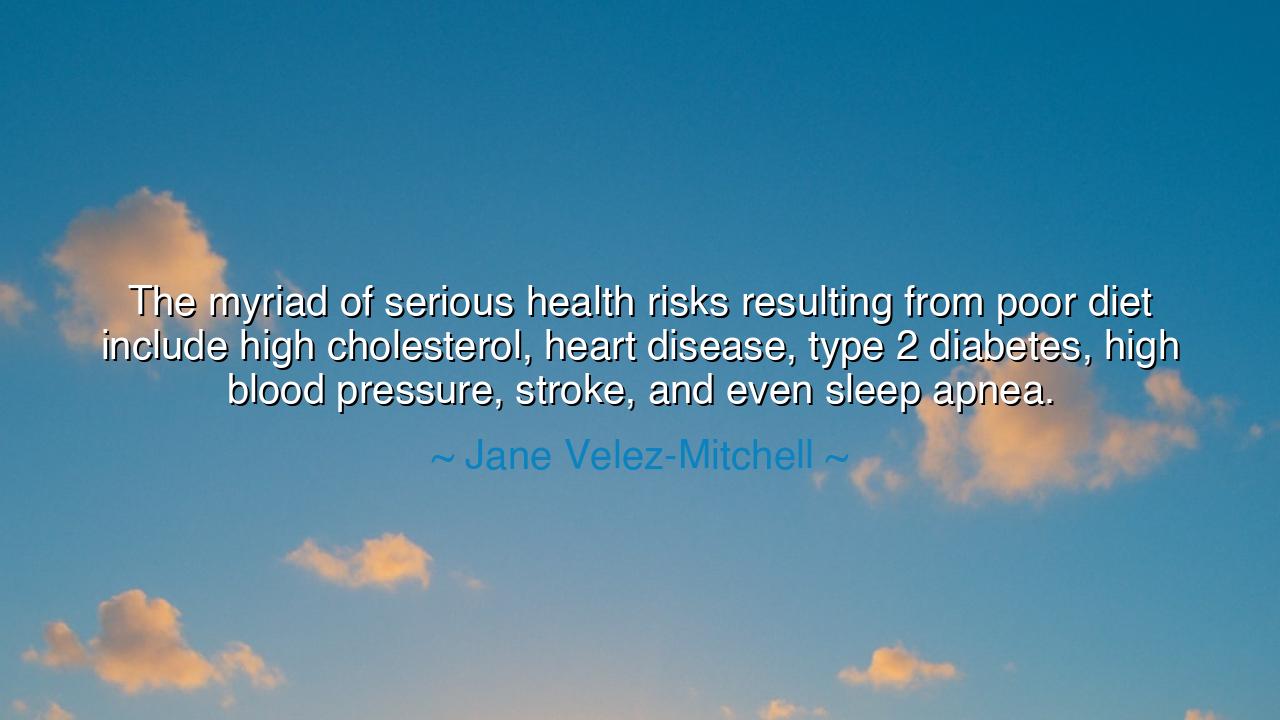
The myriad of serious health risks resulting from poor diet
The myriad of serious health risks resulting from poor diet include high cholesterol, heart disease, type 2 diabetes, high blood pressure, stroke, and even sleep apnea.






The words of Jane Velez-Mitchell, “The myriad of serious health risks resulting from poor diet include high cholesterol, heart disease, type 2 diabetes, high blood pressure, stroke, and even sleep apnea,” echo like the warning of an ancient oracle — a voice calling from the threshold of wisdom, reminding humankind of the sacred bond between what we eat and how we live. Though written in the language of modern science, her message carries the timeless rhythm of moral truth: that neglect of the body leads to decay of the spirit, and that to dishonor the temple of our flesh is to turn away from life itself.
In every age, humanity has been tested not by scarcity alone, but by excess. Where once our ancestors struggled to gather enough to survive, now we are undone by abundance — the overabundance of foods heavy with fat, sugar, and salt, the seductive flavors that promise pleasure but deliver ruin. Velez-Mitchell’s words, though clinical in tone, are the lament of a world intoxicated by convenience. They speak of a society that has forgotten the ancient laws of balance, that worships at the altar of taste while ignoring the quiet suffering of the heart, the arteries, the organs that cry out for mercy. Her message is not merely about disease, but about the slow corrosion of awareness.
The ancients understood well that diet is destiny. In the temples of Hippocrates, father of medicine, food was not indulgence but medicine itself. “Let food be thy medicine,” he taught, “and medicine be thy food.” For him, health was harmony — a symphony of body, mind, and soul. To consume without thought was to break the covenant between man and nature. Yet in our modern age, that covenant lies shattered. We have traded the orchard for the factory, the grain for the powder, the hearth for the machine. And so, the diseases Velez-Mitchell names — heart disease, diabetes, stroke — are not curses of fate, but the consequences of forgetting who we are and what we are made of.
History, too, bears witness to this truth. In ancient Rome, when the republic gave way to empire, prosperity birthed gluttony. The people feasted endlessly on meats, wines, and sweets, their tables overflowing with luxury. Physicians of the time warned that such indulgence dulled the mind and weakened the body. Indeed, as the Roman waistlines grew, so did their moral fatigue; decadence seeped into the heart of the empire until it collapsed under its own weight. The diseases of the flesh became metaphors for the diseases of civilization — corruption, excess, and the loss of restraint. In every sense, poor diet led to poor destiny.
Velez-Mitchell’s warning reminds us that our bodies are not mere machines to be fed and driven — they are gardens to be cultivated, requiring care, patience, and reverence. Each meal we take is a choice between life and decay, between clarity and confusion. The diseases she lists are not punishments; they are signals — the language of the body, crying out through pain and fatigue, begging us to return to harmony. High blood pressure, cholesterol, diabetes — these are not simply ailments of flesh, but reminders that the rhythm of nature cannot be ignored without cost.
And yet, there is hope, for the path back to health is as ancient as the harm is modern. When we return to simplicity, when we eat as our ancestors did — from the earth, from the season, from what is real — the body begins to remember its strength. The heart softens, the blood clears, the mind brightens. We need not be doctors or mystics to know this truth; it is written in every cell, in every heartbeat. Health is not a luxury; it is the natural state of balance when we live in reverence to the life that sustains us.
Let this, then, be the teaching: respect what enters your body, for it becomes part of your soul. Eat not for momentary pleasure, but for enduring vitality. Choose foods that grow, not those that are forged; foods that heal, not those that harm. Remember that every act of nourishment is an act of worship — of gratitude to the earth, to your body, and to the life that breathes within you.
For as Jane Velez-Mitchell reminds us, the cost of neglect is great — disease, exhaustion, despair — but the reward of awareness is greater still. When we honor the ancient wisdom of balance, we reclaim our birthright: a body in harmony, a mind in peace, and a life lived not in excess, but in wholeness. Thus, let each meal be a prayer, each bite a promise — that we will live with care, eat with gratitude, and walk in strength for all our days.






AAdministratorAdministrator
Welcome, honored guests. Please leave a comment, we will respond soon